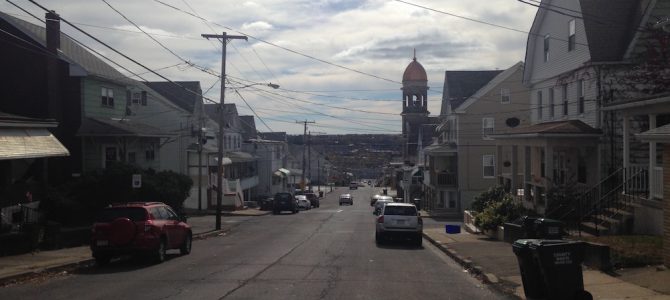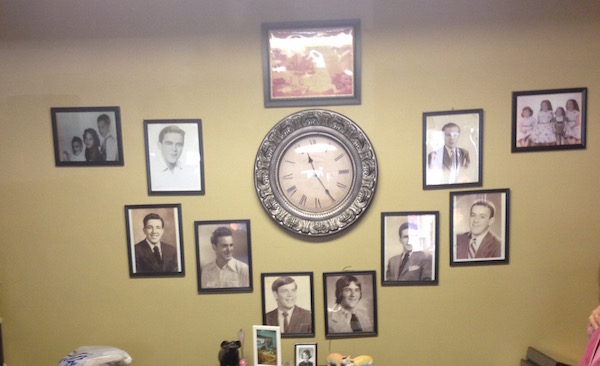
HAZLETON – Everyone here is a Chicago Cubs fan for one simple reason: Cubs manager Joe Maddon, the man who has guided the Cubs to their first World Series appearance since 1945, is a native son. He might be the most famous person ever to come out of this former mining town in northeast Pennsylvania—especially if the Cubs win.
On Tuesday night during the first game of the World Series, Maddon’s family gathered in the back of a small bar and café called Cusat’s to watch the Cubs square off against the Cleveland Indians. Maddon’s 84-year-old mother, Albina (Beanie), along with his sister, Carmine Parlatore, and various cousins and in-laws, watched the game from the best seats in the house, right in front of two flat-screen TVs and safely tucked away from the local television crews that kept coming by looking for quotes. The rest of the bar was packed with boisterous friends and neighbors sporting Cubs caps and jackets, all of them pulling for Joe and his Cubbies, of which they are all, now, ardent fans.
It wasn’t so simple back in 2008. Maddon was then head coach of the Tampa Bay Rays, which lost the World Series that year to the Philadelphia Phillies. A lot of Hazletonians are Phillies fans, and their team hadn’t won a championship in 28 years. “They all love Joe and cheer for Joe, but most people were for the Phillies that time,” says Maddon’s cousin Francine Umbriac. Philadelphia is only two hours from Hazleton, and local loyalties run deep here. Besides, Francine adds, her famous cousin had already won a World Series back in 2002, when he was bench coach for the Los Angeles Angels. “But this time it’s different,” she says. “This one is special, and I think Joe knows it.”
Hazleton’s Fraught History With Hispanic Immigration
It couldn’t have happened to a nicer guy. Ask people in Hazleton about Joe Maddon and you’ll hear a litany of generic praise—great guy, hard worker, calm under pressure—but you’ll also hear something else, which might be the highest praise a man can get anywhere: he cares about his hometown.
That means something specific and tangible here. In 2013, Maddon founded the Hazelton Integration Project and the Hazleton One Community Center. Housed not far from Maddon’s childhood home in an old Catholic parish school called Most Precious Blood, the purpose of the project, as the name implies, is to help integrate Hazleton’s burgeoning Hispanic community with the city’s predominantly white residents. The center’s sports and after school programs especially are designed to give Hazleton’s white and Hispanic kids another venue to mingle and socialize.
To understand why such a community center would be needed at all, you have to go back to 2006, when two illegal immigrants were charged for killing a white resident. Racial tensions had been building for years, as an influx of Hispanics, mostly Dominican, arrived in Hazleton looking for work and cheap housing. The city’s white population shrank from 94.7 percent in 2000 to less than 60 percent in 2010, while the share of Hispanics swelled from less than five percent to more than 37 percent. (Not coincidentally, the 2010 census showed Hazleton’s population increase for the first time since the 1940 census.)
The murder didn’t make national news, but then-Mayor Lou Barletta’s reaction did: he announced new city ordinances designed to push out Hazleton’s illegal immigrants, whom he and others blamed for rising crime rates and worsening drug problems. Employers who hired illegals would have their business permits revoked, and landlords who rented to them would be fined.
To no one’s surprise, the ordinances were struck down a year later by a federal judge. But Barletta had made a name for himself in the process. Like many towns in Pennsylvania’s former coal belt, Hazleton had been declining for decades. Crime and drugs—especially heroin, which is still a big problem here, along with opioids—was a visible and visceral problem. Arrogating federal immigration enforcement to city officials wasn’t going to fix it, but many residents felt that at least Barletta was trying to do something—and he was willing to say things that the national press might scoff at or denounce as racist. Barletta was defiant; he didn’t care.
The erstwhile mayor soon went on to bigger things. In 2008, Barletta narrowly lost a bid for Congress, but won in 2010. He’s running for reelection this November and will almost certainly win a fourth term. Campaign signs for “Lou” are all over town, and his reputation as a hardliner on immigration has followed him to Washington. Barletta was one of the first members of Congress to endorse Donald Trump, touting Trump’s tough stance on immigration, and he’s now serving as co-chairman of the Trump campaign in Pennsylvania.
How Family And Community Will Save Maddon’s City
Back in Hazleton, though, things changed. Of course, there was a period after the city’s immigration ordinances were struck down that relations between Hazleton’s Hispanics and whites were tense. All the other problems with crime and drugs were still there (and getting worse), and the recession intensified longstanding economic pains from decades of job losses.

Three generations of Joe Maddon’s family, on the back wall of the consignment shop owned by his sister and cousin.
But once it became clear that the influx of Hispanics wasn’t going to abate, attitudes shifted. “They’re the future of this place,” says Bob Curry, Maddon’s brother-in-law and the integration project’s founding president. “Our population is actually growing, which isn’t true for a lot of other towns like ours.” As Hazleton’s population grows, so does the local economy. “I think a lot people are starting to see our Hispanic community as the thing that will save Hazleton, that will give us new life. Joe certainly sees it that way.”
It’s also about something more than population growth and the local economy. Maddon’s mother, Beanie, says much of her son’s motivation grew out of a concern for the city’s young people. “He saw the problems with newcomers and their kids not integrating well, and he knew it wasn’t like that for him growing up here,” she says. “So he wanted to do something to make sure kids in Hazleton today have the same things he had growing up.”
Beanie would know. She spent most of her life in Hazleton and today lives above what used to be her father’s plumbing shop—the same place she raised her son and his siblings. Today, it’s an antique consignment shop run by Carmine and Francine. On the back wall are portraits of her father, husband, uncle, nephews—everyone who worked at the plumbing shot, as well as an old framed childhood photo of Joe with his sister Carmine and his brother Mark.
Family roots in this neighborhood go deep for the Maddons. Around the corner is Third Base Café, which Beanie’s sister opened in 1949 and where Beanie used to get out of high school during lunch to help out. She worked there, on and off, until this past July. (Asked why she kept working at age 84, Beanie quickly replies, “Well what else am I supposed to do? It keeps me young!”)
Beanie also notes that Hazleton’s previous waves of immigrants—Polish, Irish, Italian—used to be segregated off into their own churches and social clubs, “But eventually they started marrying each other. It’ll be the same with these kids today. The next generation won’t even notice any difference.”









